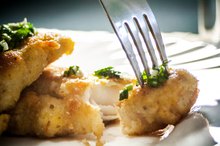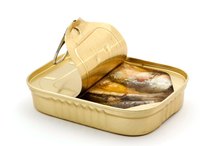What does fact checked mean?
At Healthfully, we strive to deliver objective content that is accurate and up-to-date. Our team periodically reviews articles in order to ensure content quality. The sources cited below consist of evidence from peer-reviewed journals, prominent medical organizations, academic associations, and government data.
- New England Journal of Medicine: Purine-Rich Foods, Dairy and Protein Intake, and The Risk of Gout in Men
- New England Journal of Medicine: Purine-Rich Foods, Dairy and Protein Intake, and The Risk of Gout in Men
The information contained on this site is for informational purposes only, and should not be used as a substitute for the advice of a professional health care provider. Please check with the appropriate physician regarding health questions and concerns. Although we strive to deliver accurate and up-to-date information, no guarantee to that effect is made.
Atlantic Salmon & Gout
A form of arthritis characterized by intense, sudden pain in the joints, gout was once considered a "rich man's disease" resulting from a heavy diet and inactivity. Today researchers know that a high level of uric acid crystals in the joints causes gout's symptoms -- redness, swelling, tenderness and acute pain -- and that uric acid is created when the body breaks down chemicals called purines 1. Certain seafoods are high in purines, while others, like Atlantic salmon, have nutritional benefits that may outweigh their risk to gout sufferers. Carefully managing your consumption of Atlantic salmon may help reduce your risk of developing gout or experiencing recurring outbreaks.
If you are experiencing serious medical symptoms, seek emergency treatment immediately.
Atlantic Salmon and Purines
Some fish and shellfish are very high in purines, such as:
- anchovies
- mackerel
- sardines
- scallops
- mussels
- lobster
Gout sufferers should avoid consuming high-purine species whenever possible, but lower-purine fish -- such as Atlantic salmon -- is suitable for a gout-friendly diet. To reduce the chance of flare-ups, it's best to eat seafood rarely. A 2004 study in the "New England Journal of Medicine" found that each additional weekly serving of fish or shellfish increased middle-aged men's risk of developing gout by 7 percent 2.
Suggested Serving
Tuna & Gout
Learn More
Don't eliminate heart-healthy Atlantic salmon from your diet completely. The USDA's dietary guidelines encourage Americans to increase their overall consumption of seafood from the current average of just 3.5 ounces a week. For an active adult on a 2,000 calorie-per-day plan, the USDA recommends eating 6 ounces of lean protein per day. To reduce the chance of gout attacks, limit your consumption of meat, poultry or seafood to 4 to 6 ounces daily.
- Don't eliminate heart-healthy Atlantic salmon from your diet completely.
- To reduce the chance of gout attacks, limit your consumption of meat, poultry or seafood to 4 to 6 ounces daily.
Nutritional Benefits
Atlantic salmon is an excellent source of omega-3 fatty acids, a polyunsaturated fat that is essential for overall health. Researchers believe omega-3s may help lower blood pressure or high triglycerides, reduce your chance of heart attack and stroke, and slow the progress of age-related conditions like macular generation. A 3.5 ounce serving of salmon contains about 1 gram of omega-3s. In addition, salmon provides a source of lean protein that is low in saturated fat and cholesterol.
- Atlantic salmon is an excellent source of omega-3 fatty acids, a polyunsaturated fat that is essential for overall health.
- In addition, salmon provides a source of lean protein that is low in saturated fat and cholesterol.
Other Concerns
Mackerel Diet
Learn More
Atlantic salmon is relatively low in mercury and PCBs, so it does not pose a health risk to gout sufferers who choose to eat it frequently. The Seafood Watch program of the Monterey Bay Aquarium, however, urges consumers to avoid farmed Atlantic salmon. The methods used to manage and harvest salmon in ocean-based net pens have a deleterious effect on the surrounding marine environment. As an alternative, consumers may choose wild-caught Alaskan or Pacific salmon.
- Atlantic salmon is relatively low in mercury and PCBs, so it does not pose a health risk to gout sufferers who choose to eat it frequently.
- The Seafood Watch program of the Monterey Bay Aquarium, however, urges consumers to avoid farmed Atlantic salmon.
Related Articles
References
- Gout and Uric Acid Education Society: Gout Diet
- New England Journal of Medicine: Purine-Rich Foods, Dairy and Protein Intake, and The Risk of Gout in Men
- National Institute of Arthritis and Musculoskeletal and Skin Diseases. Gout. Updated April 2016.
- Zhang Y, Chen C, Choi H, et al. Purine-rich foods intake and recurrent gout attacks. Ann Rheum Dis. 2012; 71(9):1448-53. doi:10.1136/annrheumdis-2011-201215
- Fischer E. Ueber die Harnsauer. 1 [On Uric Acid. 1]. Berichte der Deutschen Chemischen Gesellschaft. 1884: 17:328-338. doi:10.1002/cber.18980310304
- Ragab, G., Elshahaly, M., & Bardin, T. (2017). Gout: An old disease in new perspective – A review. Journal of Advanced Research, 8(5), 495–511. doi:10.1016/j.jare.2017.04.008
- Centers for Disease Control and Prevention. Gout. Updated January 28, 2019.
- Zgaga, L., Theodoratou, E., Kyle, J., Farrington, S. M., Agakov, F., Tenesa, A., … Campbell, H. (2012). The Association of Dietary Intake of Purine-Rich Vegetables, Sugar-Sweetened Beverages and Dairy with Plasma Urate, in a Cross-Sectional Study. PLoS ONE, 7(6), e38123. doi:10.1371/journal.pone.0038123
- Choi HK, Gao X, Curhan G. Vitamin C intake and the risk of gout in men: a prospective study. Arch Intern Med. 2009;169(5):502–507. doi:10.1001/archinternmed.2008.606
- Zhang Y, Neogi T, Chen C, Chaisson C, Hunter DJ, Choi HK. Cherry consumption and decreased risk of recurrent gout attacks. Arthritis Rheum. 2012;64(12):4004–4011. doi:10.1002/art.34677
- Arthritis Foundation. Gout Diet: Dos and Don’ts.
- Boban M, Modun D. Uric acid and antioxidant effects of wine. Croat Med J. 2010;51(1):16–22. doi:10.3325/cmj.2010.51.16
- Caliceti C, Calabria D, Roda A, Cicero AFG. Fructose Intake, Serum Uric Acid, and Cardiometabolic Disorders: A Critical Review. Nutrients. 2017;9(4):395. Published 2017 Apr 18. doi:10.3390/nu9040395
- U.S. Department of Health and Human Services and U.S. Department of Agriculture. 2015–2020 Dietary Guidelines for Americans. 8th Edition. Published December 2015.
- U.S. Department of Health and Human Services. Gripped by Gout. NIH News in Health. Published February 2014.
- Kakutani-Hatayama M, Kadoya M, Okazaki H, et al. Nonpharmacological Management of Gout and Hyperuricemia: Hints for Better Lifestyle. Am J Lifestyle Med. 2015;11(4):321–329. Published 2015 Sep 2. doi:10.1177/1559827615601973









